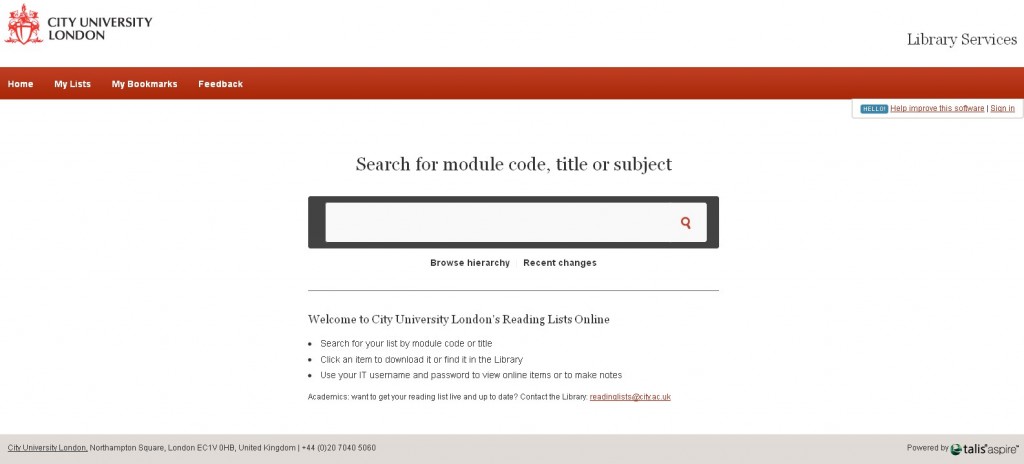Reading List Online
This blog post is written by Ajmal Sultany and Samantha Halford.
City University London has recently launched a new library software, known as the Reading Lists Online (RLO). This blog post presents the collaborative research between Library Services and the LDC, which attempts to understand the experience and perceptions of City University students towards this newly-implemented online reading list software.
An increasing number of universities have adopted an online reading list software to help them manage lists and improve the student experience. Our new online reading list, Reading List Online (powered by Talis Aspire) allows academics and the library to present reading list information in a dynamic, accessible and ultimately more useful manner. To ensure that the service is meeting students’ needs, Library Services and the Learning Development Centre created an interdisciplinary collaboration to develop an in-depth account of the experiences and perceptions of students towards Reading Lists Online.
Importance of Reading Lists in UK Higher Education
Reading lists are a crucial stepping stone between the classroom and students’ independent learning (Chad, 2012); harnessing new technology to support efficient and effective use of reading lists will help students to develop the information literacy skills needed to become competent library users and confident learners (Farmer, Maclean & Corms, 2012; Stokes & Martin, 2006).
Investing in the software
As reading lists play a central part in higher education, student learning, information literacy skills development and academic achievement (Jones, 2009; Stokes & Martin, 2008), understanding the experiences and perceptions of students using and learning from online reading lists warrants a closer investigation from higher education libraries and educational development researchers. To ensure that the service is meeting students’ needs, Library Services and the Learning Development Centre created an interdisciplinary collaboration to develop an in-depth account of the experiences and perceptions of students towards Reading Lists Online.
A bit on our research methods
Three focus groups were held with a diverse body of students (Denscombe, 2003). Students were given a demonstration of RLO then asked a number of open questions to develop an in-depth understanding of their initial reaction of Reading Lists Online. Students who had begun using the software as part of their studies were encouraged to share more of their experiences. This discussion was complemented with discourse on the concept of the reading list, access to reading material and the ideal reading list, as designed by students. In addition, all students completed the revised version of the ‘Perceived Usefulness and Ease of Use’ (PUEU) questionnaire (Davies, 1989).
Two more blog posts to come
This blog post is the first of three blog posts that will deal with Reading Lists Online. Future blog posts in this series will introduce our methodological rationale for choosing focus groups as a research method and presents some of our preliminary findings. So far we know that the quantitative analysis, based on 12 questions from the PUEU, show that users were significantly more likely to perceive the RLO as ‘useful’ and ‘easy to use’. This statistical analysis will be complemented with data from the in-depth conversations with students on what exactly they thought of the software, how it could be improved and how it may impact on their higher education experience.
This research is being led by Ajmal Sultany and Samantha Halford.
References
Chad, Ken, ‘Change will be relentless’, CILIP Update, 2012: September, 20-23.
Davis, Fred D. ‘Perceived usefulness, perceived ease of use, and user acceptance of Information Technology’, MIS Quarterly, 1989: 13(3), 319-340. [Available from http://iris.nyit.edu/~kkhoo/Spring2008/Topics/TAM/PercieveUsefulness_MIS.pdf].
Denscombe, Martyn, The Good Research Guide: for small-scale social research projects, 2nd Edn. Berkshire: Open University Press, 2003.
Farmer, Victoria, Maclean, Colin, Corns, Ian, ‘How can reading lists be effective information literacy tools?’, paper presented at LILAC 2012, Glasgow, 25-27 March 2012. [Slides available at http://www.slideshare.net/infolit_group/lilac-presentations-rgu-talis1].
Jones, Huw, Reading lists in Cambridge: a standard system? [Report], Cambridge, June 2009. [Available from http://www.dspace.cam.ac.uk/bitstream/1810/221924/1/Jones_report.pdf].
Martin, Lindsay, Stokes, Peter, ‘Reading lists under the spotlight: Cinderella or superstar?’, SCONUL Focus, 2006: 37, 33-36. [Available from http://www.sconul.ac.uk/publications/newsletter/37/11.pdf].
Stokes, Peter, Martin, Lindsay, ‘Reading lists: a study of tutor and student perceptions, expectations and realities’, Studies in Higher Education, 2008: 33(2), 113-125.




Leave a Reply